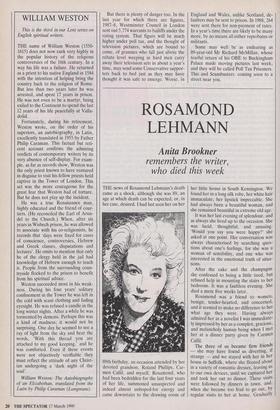WILLIAM WESTON
This is the third in our Lent series on English spiritual writers.
THE name of William Weston (1550- 1615) does not now rank very highly in the popular history of the religious controversies of the 16th century. In a way his life was a failure. He returned as a priest to his native England in 1584 with the intention of helping bring the country back to the religion of Rome. But less than two years later he was arrested, and spent 17 years in prison. He was not even to be a martyr, being exiled to the Continent to spend the last 12 years of his life peacefully at Valla- dolid.
Fortunately, during his retirement, Weston wrote, on the order of his superiors, an autobiography, in Latin, excellently translated in 1955 by Father Philip Caraman. This factual but reti- cent account confirms the admiring verdicts of contemporary writers by its very absence of self-display. For exam- ple, as far as records show, Weston was the only priest known to have ventured in disguise to visit his fellow priests held captive in the Tower of London. This act was the more courageous for the great fear that Weston had of torture. But he does not play up the incident.
He was a true Renaissance man, highly educated and the friend of cour- tiers. (He reconciled the Earl of Arun- del to the Church.) When, after six years in Wisbech prison, he was allowed to associate with his co-religionists, he records that 'days were fixed for cases of conscience, controversies, Hebrew and Greek classes, disputations and lectures'. He omits to mention that only he of the clergy held in the jail had knowledge of Hebrew enough to teach it. People from the surrounding coun- tryside flocked to the prison to benefit from his spiritual advice.
Weston succeeded most in his weak- ness. During his four years' solitary confinement in the Tower he was left in the cold with scant clothing and fading eyesight. He was refused a candle in the long winter nights. After a while he was tormented by demons. Perhaps this was a kind of madness; it would not be surprising. One day he seemed to see a ray of light from the sky and hear the words, 'With this thread you are attached to my good keeping,' and he was comforted. Even if these events were not objectively verifiable they must reflect the attitude of any Christ- ian undergoing a 'dark night of the soul'.
William Weston: The Autobiography of an Elizabethan, translated from the Latin by Philip Caraman (Longmans).


























































 Previous page
Previous page